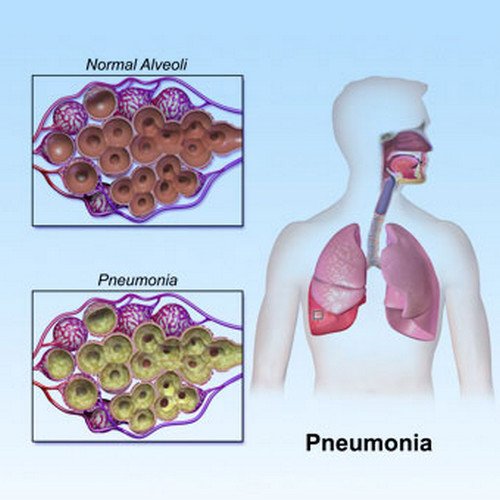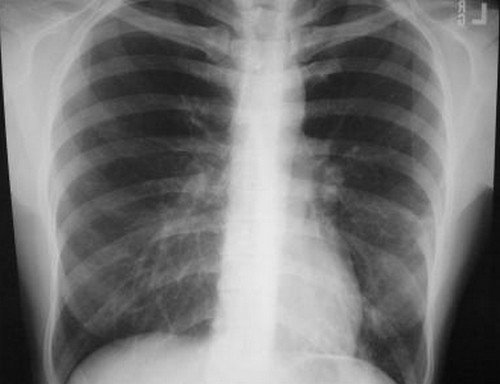Is Pneumonia Contagious ?
Last reviewed by Dr. Raj MD on January 12th, 2022.
The inflammation of airspaces in the lungs is medically known as pneumonia. It is caused by bacterial, viral, and fungal infection. Although the latter is extremely rare.
People of any age can have pneumonia, but the elderly population is the most susceptible, especially those with weakened immune system. In the United States, around 50,000 people die every year because of pneumonia. (1, 6)

Picture 1: A comparison image between a healthy airway and an airway with pneumonia.
Image Source: my.clevelandclinic.org

Image 2: A normal alveoli and an alveoli with pneumonia.
Photo Source: images.medicinenet.com

Photo 3: An x-ray image of a patient with bacterial pneumonia.
Picture Source: img.medscapestatic.com
Types of pneumonia
- Community-acquired pneumonia – It is a type of pneumonia that you acquire outside of the hospital or healthcare environment.
- Hospital acquired pneumonia – The patient acquired the pneumonia in the hospital setting. It is a serious type because the patient is already ill but for some reasons develop pneumonia in the hospital.
- Healthcare associated pneumonia – it is acquired in other healthcare settings. Examples are assisted living facilities, dialysis centers, clinics, and nursing homes. (1, 2, 3)
Classifications of pneumonia
- Bronchopneumonia – It is a severe form of pneumonia where in t eh patient has scattered and patchy infiltrates of inflammation of in the air sac.
- Lobar pneumonia – A lobe in the lung is inflamed. It usually involves the airspaces in the affected lobe.
- Lipoid pneumonia – It is the accumulation of fats in the airspaces. (3, 4)
Other classifications of pneumonia
- Aspiration pneumonia – It is a pneumonia caused by inhaling something into the lungs (drinks, food, saliva, vomitus). It is caused by impairment in the swallowing reflex such as in the case of an intoxicated person or people with brain injury.
- Atypical pneumonia/walking pneumonia – The symptoms are different from other types of pneumonia.
- Ventilator-associated pneumonia – The pneumonia is developed as the patient is on a ventilator for respiratory support, which is usually common in the intensive care setting. (4, 5, 6)
What are the clinical manifestations?
- Flu-like symptoms like wheezing and fever (pneumonia caused by virus).
- High fever, profuse sweating, confusion, and bluish discoloration of the lips and nails (pneumonia caused by bacteria).
- Rapid breathing for children below 5 years old.
- Vomiting, trouble drinking and eating, and lack of energy for infant.
- Low body temperature for older people. (5, 6, 7)
How long is pneumonia contagious ?
Can you catch pneumonia from someone who has it? Is pneumonia contagious to babies? Who are at risk? Bacterial pneumonia is usually not contagious, but there is a possibility that the bacteria can be spread from one person to another.
However, those susceptible are people with a weak immune system. Bacterial pneumonia that is highly contagious is the one caused by Mycoplasma pneumonia. The disease can be spread through droplets. A person with pneumonia who coughs and sneezes in front of other people can spread the disease. The contagious period if usually one to two days, but it can also last for weeks. (7, 8, 9)
Once the patient is put on antibiotics, the contagious period subsides. The person with bacterial pneumonia is no longer contagious after 48 hours on antibiotics. For viral pneumonia, the patient will be no longer contagious if the symptoms have improved, usually if the patient no longer has a fever.
Babies and young children may get pneumonia from respiratory syncytial virus (RSV) such as pneumonia acquired at birth. For young children, pneumonia can be acquired through exposure to virus or bacteria. (4, 10)
Who is at risk for pneumonia?
- Infants (birth up to 2 years old)
- 65 year old and above
- Stroke patients
- Those bedridden
- Those who have difficulty swallowing
- Those who have a weak immune system
- Chronic smokers and use illicit drugs
- Those who are chronic drinkers
- Those with chronic medical condition such as diabetes mellitus, cardiac-related disease, asthma, and cystic fibrosis. (2, 3, 9)
What is the cause of pneumonia?
- Streptococcus pneumonia (common cause of pneumonia)
- Legionella pneumophila
- Mycoplasma pneumonia
- Chlamydophila pneumonia
- Haemophilus influenza (common cause of pneumonia in babies and children below 5 years old)
- Influenza virus (common cause of viral pneumonia in adult)
- Measles and varicella viruses
- Severe acute respiratory syndrome (deadly pneumonia)
- Middle east respiratory syndrome (deadly pneumonia)
- Cryptococcus, Histoplasma, and Coccidioides (fungi that cause pneumonia)
- Pneumocystis jiroveci/Pneumocystis carinii (common cause of pneumonia in patients with HIV/AIDS. (3, 7, 8)
Is pneumonia curable?
Can you treat pneumonia? If yes, then what are the treatment remedies? The treatment depends on the type of pneumonia, the severity of the condition, and the overall health condition of the patient. Depending on the cause of pneumonia, the doctor will prescribe antibiotic, antiviral drug, and antifungal medications.
Fortunately, most cases of pneumonia can be treated at home provided prescription drugs are taken religiously. For the management of related symptoms such as fever and flu-like symptoms, over the counter medications can be used such as aspirin, acetaminophen, and ibuprofen. (4, 9, 10)
Home remedies for pneumonia
- Take the prescribed drugs religiously.
- Get plenty of rest.
- Increase your fluid intake, especially water and natural fruit juices.
- Avoid over exhaustion.
If the symptoms are severe and the patient feels weak and helpless, a hospitalization might be warranted. The doctor will put you on strict medications and healthcare regimen to significantly improve your condition.
The treatment includes the following:
- Antibiotics – The antibiotic treatment is introduced to the patient via intravenous route so that the drug will reach the target areas of the body faster.
- Respiratory therapy – This technique aims to deliver medicines directly into the lungs. The drug will be given directly by a certified respiratory therapist.
- Oxygen therapy – It is given to the patient to maintain the oxygen level in the blood. The oxygen is introduced to the patient via facial mask or nasal tube. If the patient is severely ill, the oxygen is introduced via ventilator. (2, 3, 6, 7)
Recovery time and outlook
The patient has a positive prognosis if all the necessary treatment is given. For people with severe pneumonia, too young or too old patient, there could be some complications. Severely infected people that failed to receive the necessary treatment could eventually die.
As with the recovery period, it depends on the type of pneumonia and how well your body cope with the infection. A normal healthy person can go back to his usual self after a week of religious treatment. Some people may take longer to recover. (8, 9, 10)
References:
- https://www.healthline.com/health/pneumonia
- https://www.webmd.com/lung/tc/pneumonia-topic-overview#1
- https://www.mayoclinic.org/diseases-conditions/pneumonia/symptoms-causes/syc-20354204
- https://www.mayoclinic.org/diseases-conditions/pneumonia/diagnosis-treatment/drc-20354210
- https://www.medicinenet.com/pneumonia_facts/article.htm
- https://en.wikipedia.org/wiki/Pneumonia
- https://www.medicalnewstoday.com/articles/151632.php
- https://www.nhs.uk/conditions/pneumonia/
- https://www.healthdirect.gov.au/pneumonia
- https://www.blf.org.uk/support-for-you/pneumonia/what-is-pneumonia